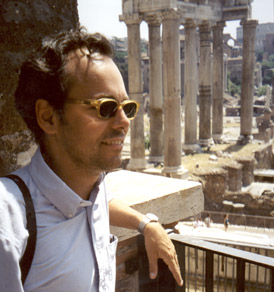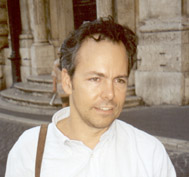|

Web
Exclusives:Features
a PAW web exclusive column
August
5, 2001:
La Dolce Tour-a
Tom Rankin '83, a Romaphile, shows others the hidden and
not-so-hidden treasures of the Eternal City
by Lou Jacobson
 Tom
Rankin '83 isn't Italian, but he might as well be. In 1995, Tom
Rankin '83 isn't Italian, but he might as well be. In 1995,
Rankin founded Scala Reale, a service that offers walking tours
of
Rome. Every year, 3,000 people - 95 percent of them Americans -
take
his tours, which are designed to be an intellectual cut above the
competition. With word of mouth spreading and guidebook citations
multiplying, Scala Reale - Italian for "full scale" -
has established
a solid foothold in Rankin's adopted city.
When PAW visited Rankin
in June, he was leading a three-hour tour
through Rome's cobblestoned backstreets. Stopping to absorb such
venerable sites as the Spanish Steps, the Pantheon, the Capitoline
Hill, and the Roman Forum, Rankin explained their history in a
casual, unrehearsed manner, as pedestrians and motorbikes whizzed
by.
The idea of Scala Reale, Rankin says, is to provide travelers with
a
more complete understanding than the best guidebooks can offer -
without herding visitors into crowded, overly programmed tours.
Unlike most big-city tour operators, Scala Reale requires that
visitors apply in advance, so that Rankin can arrange tours
appropriate to their interests, such as history, culture, or
architecture. He employs roughly 20 guides with a variety of
specialties. Most are graduate students with experience living in
Rome.
"Most of our promotion
and booking takes place through the Internet
now," Rankin says. "Visitors to our web site, www.scalareale.org,
fill out an on-line application form with basic information, dates,
and interests, and then we respond with a proposed itinerary. This
allows us to keep the cultural level of our activities quite a bit
higher than standard sightseeing tours, and to carefully control
the
size of our groups, which rarely exceed six people. Although the
activities we propose may involve only a couple of short walks,
lectures, or seminars the procedure is not unlike that of any
academic program."
 Growing
up in Boston, Rankin made regular treks to the North End, the Growing
up in Boston, Rankin made regular treks to the North End, the
Italian-American neighborhood where his father (who wasn't Italian)
once lived. Though Rankin grew up in the suburbs, "we would
still go
into the North End regularly, especially at Christmas time, so I
felt
at home with the Italian lifestyle," he says. "There have
been
Italophiles in my family for several generations, and I was also
influenced by Italian cinema, specifically the endless cycle of
double-features of Fellini, Antonioni, Wertmuller, and other Italian
directors that played at the Harvard Square Cinema while I was in
high school."
Now 40, Rankin studied
architecture at Princeton and worked as a DJ
for WPRB. He learned little about Roman history on campus; that
came
later. "After Princeton, I first traveled to Europe on a three-month
stint," he says. "I came back to the U.S. to work in architectural
firms, but I always had a European bug calling me back." He
returned
to Italy for six months in 1986, then studied for a master's degree
in architecture at the Harvard Graduate School of Design. After
earning his degree, Rankin returned to Italy with a Fulbright grant.
"After experiencing frustration and lack of pay as an architect
in
Rome and Milan, I found myself making ends meet with extra work
-
teaching English, consulting, and leading walking tours." Rankin's
first tours were for friends. Then, in 1993, he turned professional,
leading tours for a company called Secret Walks.
The idea for Scala Reale,
Rankin says, emerged when he decided that
there was a need for a tour company with a solid sense of the
American market. Along with his Italian wife, architectural
restoration student Lucia Principato, Rankin founded Scala Reale
in
1995. Almost immediately, they began marketing the company on the
Internet - long before many Italian companies did. They also
established affiliations with tour companies in Florence and Venice.
Rankin says he doesn't plan to expand too quickly. "We're attempting
to keep the numbers of acceptances fairly constant, to maintain
quality - and sanity," he says. Tours rarely include more than
six
people. But he does intend to steer the company into more
participatory offerings, such as archaeological digs, as well as
more
opportunities to guide visitors through sites normally closed to
the
public.
Rankin acknowledges that
Rome has its share of challenges, from
keeping traffic jams and vehicle emissions under control to simply
keeping old buildings standing. ("Every month or so, some piece
of a
building falls somewhere," he says.) But he is encouraged by
recent
government efforts to preserve the ancient city. And he says that
the
culture and history of Rome is hard to beat.
"Rome has something
from every period," he says, taking a sip of
espresso at a local cafe. "Florence is a Renaissance city.
Venice is
Byzantine. But Rome has something from the ancient period, the
medieval period, the Renaissance, and the Baroque era. It has
monuments from the Mussolini era and up to the present day. Plus,
it's a living city. So many other historical cities are mummified
museums. The Roman mentality is to have a nonchalant appreciation
for
the heritage. It's a good thing. You can hang out and play guitar
at
the Pantheon and people won't be too fussy. They've found a happy
medium between love and respect for the heritage, and the ability
to
use it in a modern way. The classic image of Rome is a woman on
a
cell phone leaning on an ancient column." - Louis Jacobson
'92
Standard, four-hour tours from Scala Reale's regular menu run
approximately $50 per person for up to five people. Specially
arranged tours cost $250 per group for a half-day outing and $400
for
a full day. Private excursions outside Rome can also be arranged.
More information at www.scalareale.org.
Lou Jacobson is a frequent
contributor to PAW.
|

 Tom
Rankin '83 isn't Italian, but he might as well be. In 1995,
Tom
Rankin '83 isn't Italian, but he might as well be. In 1995,  Growing
up in Boston, Rankin made regular treks to the North End, the
Growing
up in Boston, Rankin made regular treks to the North End, the